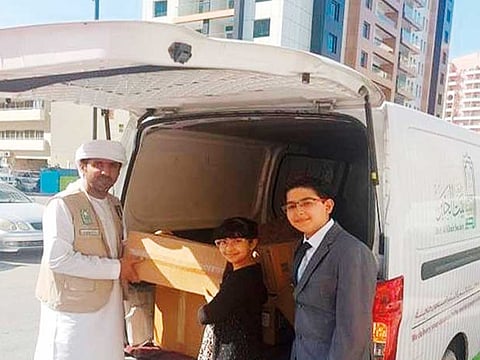Dubai-based pupils adopt a green lifestyle
These siblings participated in environmentally friendly practices through the month of Ramadan

Dubai: Ramadan has come to an end, but during the month of sharing, caring and spiritual reflection, my sister and I decided to go green.
We thought it was a great opportunity to consider making a shift towards a ‘green lifestyle’ that is environmentally friendly, non-polluting, non-wasteful and aims towards conservation of natural resources. This not only improves the quality of life but also aims at sustainable development through the year and our lives.
We decided to create awareness on the subject, think and act positively towards our environment and change our unfriendly habits, which are impacting our ecosystem.
Some of the things we did were use old newspapers and magazines to make greeting cards. We sowed seeds of fruits, like papaya, watermelon, pear and apple and also pulses, fenugreek and spring onion to grow plants in used yogurt containers for our kitchen garden, rather than throwing them in the bin.
They also grew plants in used plastic containers. Photo: Aaditya Gandhi
Other activities included upcycling of waste materials, like making an iftar snack tray using coconut shells and collection of cans from iftar parties for recycling.
We also had candle light dinners to reduce power consumption. Simple things like using a glass of water to brush teeth and storing water in buckets for controlled use also helped to save water. We used cloth bags instead of plastic bags for grocery shopping.
We also educated the people in our building about eating healthy during Ramadan, using food items judiciously during iftars, giving excess food to people in need, proper waste disposal at home, recycling materials especially plastic water bottles, replacing light bulbs with energy saver bulbs to conserve electricity, minimum usage of plastic bags, reducing water consumption as well as using degradable paper products for iftars.
Following these tips certainly made Ramadan eco-friendly and hopefully a greener future.
Ramadan is also considered a time of giving and as part of our initiative we also initiated a campaign to request and encourage everyone to donate clothes, books and toys for underprivileged children. This would also serve as a means of reusing these items that would have otherwise been discarded in the landfills, but were instead used for a great cause.
We distributed a few of these to the children of the community workers in our neighbourhood and the rest to the humanitarian organisations Beit Al Khair and Emirates Red Crescent.
Gautam Kapur, a banker who participated in the campaign, believes that Ramadan is a blessed month when we get an opportunity to help the underprivileged and we should give back to the society in as many ways as we can.
He said: “Different things that we take for granted may be really important to someone in need and can make a great difference in their lives.”
Durga, a housekeeper in Dubai, said: “My children felt really happy, grateful and thankful when they received books, clothes and toys through this initiative.”
We must be aware of our wasteful habits, which are affecting the environment and our future generations. Any mismanagement of our precious resources will have irreversible impact on our ecology. Being sensitive to the harm that we do to our environment and being committed to living in harmony with Nature, we must seek to implement practices and policies that are environmentally safe.
We would like to motivate everyone to adopt these green practices. Just because Ramadan is over, they shouldn’t be discouraged. These can be adopted all year round!
— The reader is a pupil based in Dubai.
Be a community reporter. Tell us what is happening in your community. Send us your videos and pictures at readers@gulfnews.com



